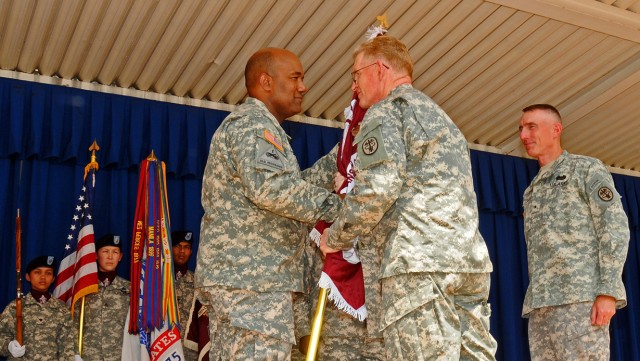
WASHINGTON (Army News Service, Sept. 1, 2010) -- The Army's Warrior Transition Command celebrated its first change of command since its inception nearly 17 months ago in the Pentagon courtyard Aug. 26.
Incoming commanding officer Col. Darryl A. Williams took the helm from Brig. Gen. Gary H. Cheek who was the first commander of the WTC when it stood up April 9, 2009. The WTC provides guidance and policy for 29 Warrior Transition Units and nine Community Based Warrior Training Units.
Since its beginning the WTUs and CBWTUs have provided care for nearly 10,000 wounded, ill and injured Soldiers and their families -- helping them make the transition from the Army into civilian life or back into the active Army.
Guest speaker Lt. Gen. Eric B. Schoomaker, Army Surgeon General and commander of Army Medical Command praised Cheek -- a life-long artillery officer -- for his most recent re-engineering of remote warrior care in the heartland by teaming with civilian partners.
Schoomaker said the model Cheek and his staff put into action allows Soldiers to keep close to their families and units in the National Guard and Reserve, their communities and potential employers or current employers.
"That model we hope will be applied for other Soldiers not within the warrior transition community who are medically not ready and to this day are struggling to receive the kind of ... prompt timely care they so much deserve," he said.
Prior to the changing of the colors, Schoomaker awarded Cheek the Distinguished Service Medal and the Order of the Military Medical Merit. He also inducted Cheek as an honorary member of the Army Medical Department Regiment -- a rarity for an artillery officer. Cheek's wife, Leslie, was also recognized by Schoomaker as a friend of the regiment.
In Cheek's farewell, he said his perspective on the WTC was to help the warriors in the program reach their goals and desires: "We've got to make them see the future, because it's not about what's wrong; it's about what's right ... it's not about disabilities; it's about abilities.
Cheek's new assignment will be as director of Military Personnel Management.
Col. Darryl A. Williams also spent his career as an artillery officer, though he said his transition from artillery won't be as big a jump as it was for Cheek, because his previous position had been as the deputy director for Comprehensive Soldier Fitness.
"What a noble mission it is to take care of our Soldiers who have served their nation, (or) given their lives or their limbs," he said.
"It's a surreal kind of thing for me to be here right now quite frankly," Williams said. "I don't know a whole lot about the job right now, but the WTC is a weigh station on to another career or a return to the Army and it's here we start the healing process."
Williams said he knows what Soldiering is about. He's had combat experience and 27 years of active duty experience. He's never been wounded though, and said he doesn't professes to know what that's like. He has served in and lost Soldiers in Iraq and feels the first thing he needs to do is "walk-a-mile in these Soldiers' shoes."
"I really want to touch these Soldiers and hear their stories," he said. "I want to jump down and visit them, and hear what they have to say."

Social Sharing